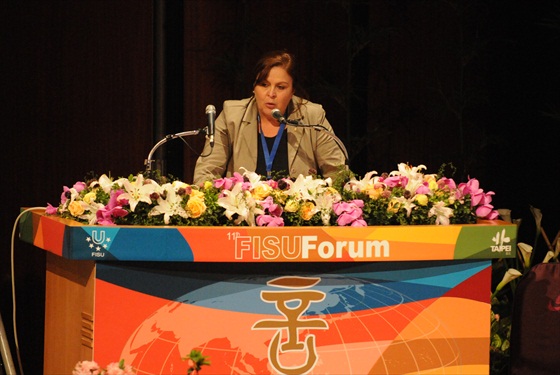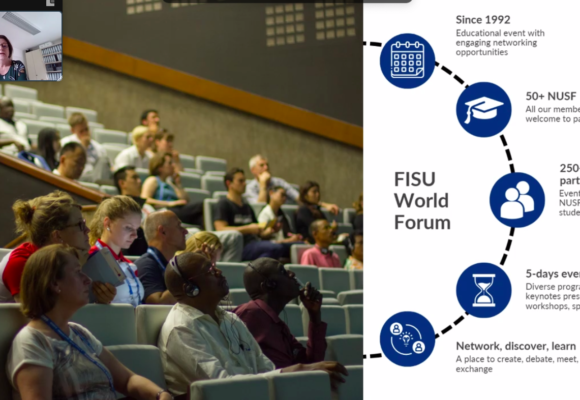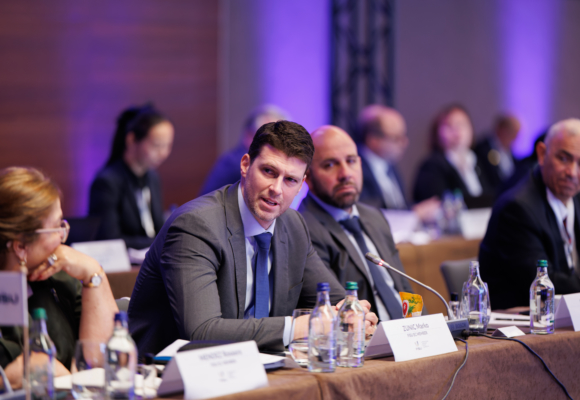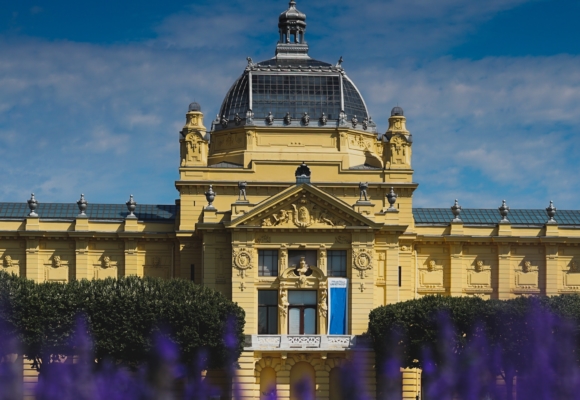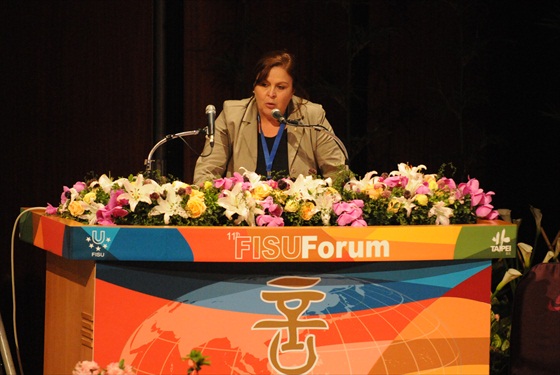 GEC Chair Ms Rosaura Mendez (CRC)
GEC Chair Ms Rosaura Mendez (CRC)
TAIPEI CITY – The morning of day three at the 11th FISU Forum was focused on women’s engagement and gender equality. A trio of speakers addressed the delegates, discussing how university sport can be a platform for increased women’s engagement and leadership.
FISU Assessor and Chair of the Gender Equality Committee, Mrs. Rosaura Mendez, of Cost Rica, was first to speak, instilling the message that “Today, it’s time to work together.” Mrs. Mendez then explained the history of the gender equality committee, which was formed in 2007 as the women’s committee before being renamed at last year’s FISU conference at the Summer Universiade in Shenzhen. According to Mrs. Mendez, after four years of existence, the committee has made FISU be “recognized in the world as a leader in gender equality.”
Ms. Raija Mattila of Finland, who is the Co-Chair of the International Working Group on Woman and Sport (IWG) then spoke on the importance of increasing women’s engagement in sport and upholding the values of the Brighton Declaration. The Brighton Declaration, which was the result of the first IWG conference in 1994 aims to “develop a sporting culture that enables and values the full involvement of women in every aspect of sport.”
FISU signed the Brighton Declaration last year, something that Mrs Matilla believes to be very significant. “[FISU] is an umbrella organization for all the university sport federation,” Mrs Matilla said in an interview. “It is important because when FISU commits itself to [the Brighton Declaration] it is also giving a responsibility to its members. I’m looking forward to student sport organizations around the world taking action.”
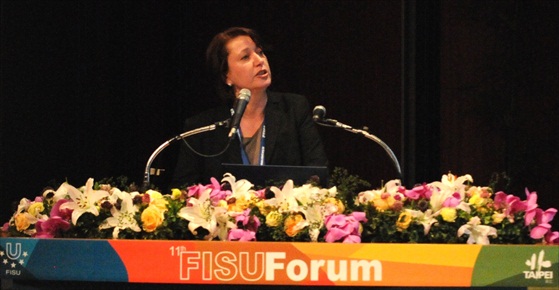 FISU IPC Chair Ms. Verena Burk (GER)
FISU IPC Chair Ms. Verena Burk (GER)
The final speaker of the morning was Ms. Verena Burk of Germany, a member of the FISU Executive Committee and Chair of the FISU Media Committee. Mrs Burk discussed the portrayal of women’s sports in the media and the problems that exist in terms of coverage and representation. Mrs Burk referenced studies that show that the vast majority of media coverage is sports is dominated by male sports and when female sports are covered, they are covered in a stereotypical, sexist way. Mrs Burk argued that a change in these attitudes would be key for increased gender equality in sport.
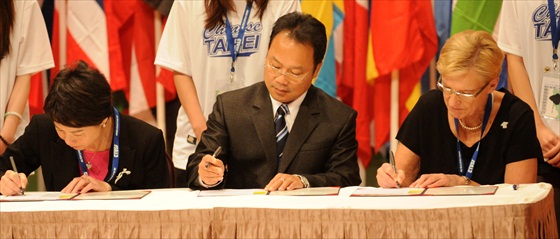 Brighton Declaration signature
Brighton Declaration signature
Following the speeches, Chinese Taipei became an official signatory of the Brighton Declaration. Mrs Matilla was pleased with the country’s decision to sign the declaration, which she calls “a first step to committing the organization to the principles of the Brighton Declaration”. She added “I hope this gives a background for [Chinese Taipei] to take action after this because it is important to share these values, but it is even more important to implement them.”
After her addressing the forum, Mrs Matilla was excited to see what would come out of the workshops and the rest of the forum. “I think that there is a difference between the older and younger generations these days,” she said. “Equality is more an everyday habit for the younger generation and I think society has changed so that there is a better possibility in the field of sport to have more equality. I’m very excited to hear what the younger people come up with.”
Mrs Matilla also wanted to leave a distinct idea for all those who listened to her speak. “I just want leave a message that it’s good for all, for both men and women and for sport,” she said. “If there’s more equal participation, more equal possibilities for everyone to participate and have roles at all level.”
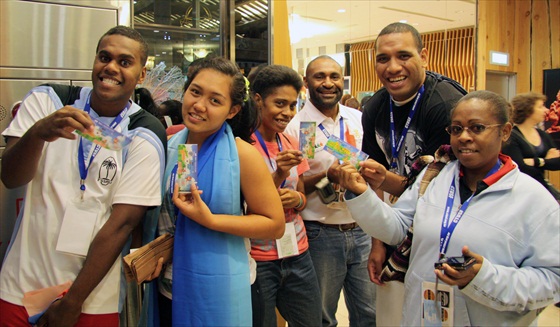 Taipei 101 cultural programme
Taipei 101 cultural programme
In the afternoon, the delegates took part in their second cultural programme of the forum, travelling to local landmark, Taipei 101. Taipei 101 was the tallest building in the world from its opening in 2004 until 2010 when the Burj Kalifa was constructed in Dubai. Standing at 101 floors and over 500 metres, Taipei 101 offered the participants of the FISU forum a bird’s eye view of Taipei City.
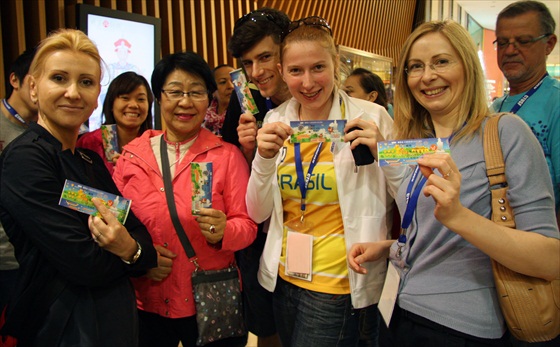 Forum participants ready for the ascent
Forum participants ready for the ascent
(Source: Justin Fauteux – Students Committee)
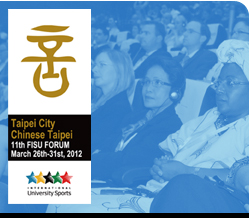
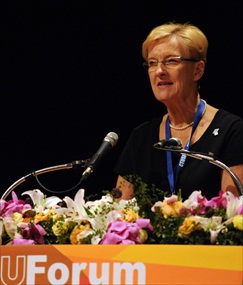 Ms. Raija Mattila, IWG Co-Chair
Ms. Raija Mattila, IWG Co-Chair
“The forum is very different from the FISU conference. The conference is very professional, but the forum has more freedom from students to participate and present their opinion. It’s a really good opportunity for students.”
Zhong Bingshu, China
“[The forum is] a very important part of FISU. We take the themes of the forum to give an important aspect for a much stronger integration between students and the activities of FISU.”
Sotero Vazquez, Dominican Republic
“Quantify and qualify, because of that we can develop.”
Raymond S. Preston, Cook Islands
“Everything we have done until now is very interesting and time is deter well”
Keren Levy, Israel
“It’s a good occasion to meet people around the world to share ideas”
Pierre Luigi Carra, Italy
“I think that the organization and timing is very good and management is the top”
Jacob Nteree, Kenya
“So far the forum had a really good start”
Sami Garabedian, Lebanon
“Volunteer work is so well organized”
Marisol Pedrasa, Mexico
“The beginning I didn’t know what to expect it but I’m loving it”
Michael Cochrane, New Zealand
“It’s a great event to meet with other federations and discuss some topics”
Karl Haaland, Norway

